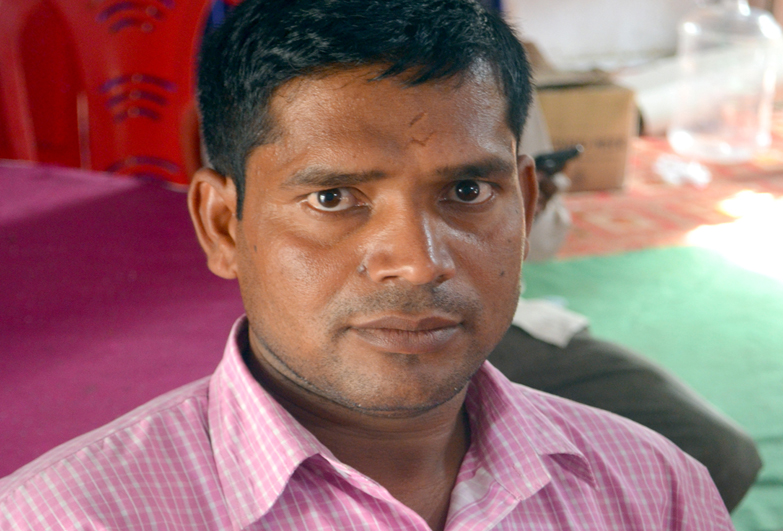Disclaimer: This article is more than 7 years old, and may not include the most up-to-date information or statistics. Please verify information with more recent sources as needed, and if you have any questions contact our Press Office.
Ruchi Gupta from Centre for Education and Communication and Sarah Mount of Anti-Slavery International

28 April 2016
Shahid’s story*
“When I arrived, my passport was taken from me and I was told I was going to be a shepherd, not work in the job I was promised. I protested – I was educated and trained – I did not come to Saudi Arabia to be a shepherd. My employer said things had changed, then he ‘gave’ me to someone else.
This new person was a police officer. He also had a farm – a big farm. It was so big that he had a helicopter that he flew sometimes to remote parts of the farm. I was forced to be a shepherd there – to do ‘animal husbandry’. I lived out in the desert, in a shed with a tarpaulin roof. I was given basic food, it was not enough. It was some rice, dahl, also the same food as the animals, animal fodder.
I was not allowed to leave the farm. He took my passport, but did not give me a residence permit. I couldn’t go anywhere without it. Luckily, I met a worker from India nearby – he leant me his phone and I messaged my family here. This person was working in the farm for more than two years, but he chose to continue since he had no other way of repaying debts back home.
I left India to try and earn more money – to have a good job. I was told by the agent – that I had to pay 85,000 rupees (approx. £880) to him. I thought he was the agent, but there was another one in Mumbai. The one in the village was a sub-agent. I didn’t ask if he was registered – I didn’t know. I gave him the money. I received the contract only with the air ticket, a day before my departure. It was a piece of paper in Arabic.
One day, after I had told my family [who had complained via an Indian Government mechanism], the ‘employer’ dropped me at the airport. He said I could go home and gave me my passport and a flight ticket. I didn’t get any wages at all – he said that he deducted the air ticket cost from my wages and there was none left.
I mortgaged my farm land for this.”
We heard Shahid’s this recently at one of our trainings in Uttar Pradesh, which we’ve been conducting for workers migrating to the Gulf.
You can see why it’s needed – Shahid’s very common story shows the level of exploitation occurring, including forms of forced labour. So far in our trainings, many workers have said that they arrived in the Gulf to find out they were going to do another, much more menial job than what they were promised, with much lower pay.
Almost all workers we have met, that have migrated to the Gulf before, have paid an illegal recruitment fee, on average around £800. They are told that this is to pay for their airfare and other costs, even though under Indian law the employers must pay for this. In reality, the employers transfer these costs to the agents, as well as high costs for the employers to visit India for business. To cover these costs, the agents then get the workers to pay high fees.
Workers hardly ever receive contracts – just a one-sided sheet of paper with information in Arabic, if at all. In many cases, they receive this piece of paper at the same time as they get their air ticket – after they have already paid and just before leaving.
Most workers do not ask the agents if they are registered, don’t ask for contracts in time to scrutinise them, don’t think about asking free government services to help translate the documents (and don’t know about these in the first place), don’t ask about insurance, don’t know where they can go for help and don’t know what to do before they leave to reduce the likelihood of exploitation.
Our trainings are aimed at improving this situation – so workers are armed with the knowledge before they leave, so that the process of migration for work is safer. The trainings discuss all the steps in the migration process – both pre and post departure – and the key documents required, how to reduce risk and stay safe, who to contact when in need. We explain the provisions provided by the Government of India to ensure safe migration, including minimum wages agreed between the governments, insurance and checking the company’s and agent’s registration with the Protector of Emigrants. Every worker is given a worker passbook, which is a passport sized book with all information that workers require pre-departure and once they arrive.
Since July last year, we have conducted 8 worker trainings in Uttar Pradesh, reaching migrant workers that have not before been provided any information or training. A large number of them have asked us to repeat these trainings at regular intervals and at more places. More trainings are planned, including for community based organisations and local unions operating in Uttar Pradesh, so that they also are aware of these issues and can provide some assistance to migrant workers in their area.
We hope that an increasing number of workers will be armed with information, and more confidence, to reduce the likelihood of exploitation – to be able to ask for proper contracts, insurance details, and question recruitment fees – and to seek assistance when necessary, both in India and in the Gulf.
This blog was first published by UNISON at https://www.unison.org.uk/blogs/2016/04/my-employer-gave-me-to-someone-else/.
The project on safe migration to the Gulf is supported by UNISON International Development Fund, and implemented by Centre for Education and Communication and Anti-Slavery International, with the help of local partner Bhawan Nirmaan Karmakar Mazdoor Union.
*Name changed





